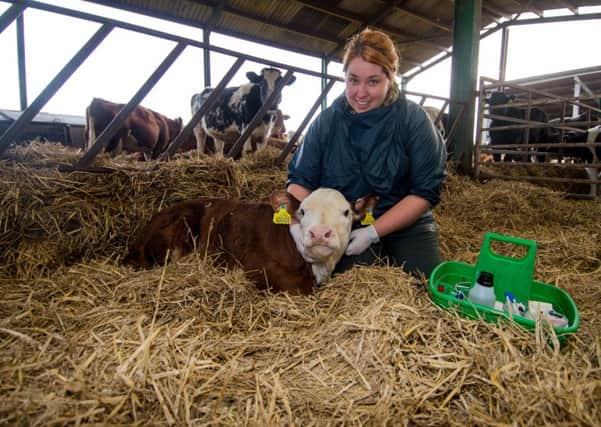Disease prevention to the fore for new generation of farm vets


It’s just as well this is the case given the problems that lurk in cattle and sheep sheds particularly at this time of year when many herds and flocks are wintered indoors.
“We still undertake a lot of ‘fire engine’ sick animal work but livestock farmers are very conscientious when it comes to animal welfare and most do all they can to prevent illnesses and infections. Vaccination is my theme. Many diseases we see on farms are preventable or are at least able to be lessened in their severity by vaccination. This can really help with problems such as pneumonia.
Advertisement
Hide AdAdvertisement
Hide Ad“Problems can start when cattle are bought from multiple sources. Buying perhaps from five different farms means that you can’t possibly know all about each animal and you can be buying something with a stressed immune system already. If that then gets mixed in with some kind of virus then the whole thing can explode into a much greater problem.
“We now get a lot of customers who will buy animals through the market here at Murton and will then immediately come and buy the appropriate number of doses to eradicate any problems. That’s the right way to deal with the situation.”
Ashley and her colleagues Ricardo Borralheiro, from Portugal, and Harry Eastwood have around 150 beef and dairy cattle clients, 100-plus with sheep and a growing number with alpacas and goats. Cattle form around 60 per cent of the practice’s work and there are currently two main areas of concern – bovine viral diarrhoea (BVD) and bovine TB. The latter has been around for many years and has been the subject of much consternation but while it hasn’t blighted Ashley’s area up until now BVD is taking is toll, even if as Ashley explains in some cases farmers may not be aware of it and how contagious it is.
“We see it regularly and unless you blood test your cattle you often don’t know your animals are suffering. It’s one of those weird diseases that people don’t realise how much of an impact it is having on their herd until they are finally rid of it.
Advertisement
Hide AdAdvertisement
Hide Ad“It is an insidious virus that doesn’t really have much to do with diarrhoea in the way humans have it but it does make them more prone to infectious diseases. It affects fertility, can mean reabsorption of calves in the first trimester, calves can be born with deformities and with the virus, known as PI (persistently infected) that then act as an immune dampener for everything around them. If you have just one PI calf you may find you have a lot more pneumonia in your calf rearing enterprise due to the immunity being knocked.
“Essentially it is self perpetuating so the only way to get the herd back on the right track is to cull PI animals. Culling PI animals and vaccinating the rest are the two ways in which it can be controlled, but first you’ve got to locate it.
“We are organising a meeting here at the livestock market in February when we will be explaining about the new BVD scheme. Farmers are being encouraged to find out the status of their farm and whether they are BVD free.
“Blood testing is the first step and the tests we undertake are turned around within a week. Many herds will have had instances of BVD without ever realising. I’ve certainly had a number with it and now we have a lot of our farms on vaccination protocols to ensure its limitation and hopefully soon its eradication.”
Advertisement
Hide AdAdvertisement
Hide AdEarlier this week when I visited, Ashley had just completed a routine TB skin test on 300 cattle. Tests such as these always leave the farmer in limbo for a while.
“We read the results of the tests 72 hours later and the determination of whether cattle test positive is dependent on measurement of lumps that might appear having received a dose of tuberculin.
“The worst possible news would be if one is a reactor. That would mean the animal would be culled and whole herd restrictions would apply. Fortunately we have not had any but there is always a danger if people buy from TB hot areas.”
Emotion was never too far from the surface in the TV series All Creatures Great & Small that featured the fictional James Herriot. Ashley is a straight-forward, down-to-earth vet and one with a big heart.
Advertisement
Hide AdAdvertisement
Hide Ad“The thing about farm animal vets is that we see the same people time and time again regularly for extended periods of time. Our farmers are not just clients they are friends. When something hurts them it hurts us too.”